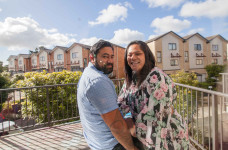Publication
Rapid rehousing
Last updated: 12 February 2025 Rapid rehousing helps individuals and whānau quickly exit homelessness and get back into permanent housing. Once they’re back in stable housing, it also provides support to help them maintain their tenancies and avoid a return to homelessness.
About rapid rehousing
Rapid rehousing aims to support people who have recently become homeless, or are at risk of becoming homeless, and who have low-to-medium complexity of social service needs. For example, they might not have anywhere to live because the rental they’ve been living in has been sold, or their relationship has broken down, rather than because they have complex, ongoing issues such as mental or physical health concerns or problems with drugs or alcohol.
Once people are back in stable housing, support services will work with them to assess their support needs and develop a whānau-led goal plan. They will provide services based on this plan to help them hold onto their tenancy and deal with any underlying issues that led to them becoming homeless.
Rapid rehousing was introduced as a two-year trial starting in July 2020 as part of the Aotearoa Homelessness Action Plan.
You can read more about the Aotearoa Homelessness Action Plan here.
Who is rapid rehousing for?
Rapid rehousing is for individuals and whānau who:
- are recently homeless or are at risk of experiencing homelessness
- need low-to-medium levels of support to access and maintain permanent housing
- require specialist homelessness support for a finite period (up to 12 months).
For people who don’t meet the criteria, for example, they’ve been experiencing homelessness for longer than 12 months and need higher levels of support over the long-term, the housing first programme is available instead.
See details about housing first.
How to access rapid rehousing services
Individuals, families and whānau can self-refer to support services. Support services can also reach out to them through:
- government departments and agencies
- local Māori organisations and iwi
- local GPs and health organisations
local community organisations.
Location of rapid rehousing services
Mid-Far North
|
Service |
Providers |
Locations |
|
Kāinga Pūmanawa
|
Kāhui Tū Kaha |
Dargaville |
Whangārei
|
Service |
Providers |
Locations |
|
Kāinga Pūmanawa |
Whangārei |
|
|
|
Whangārei |
|
|
|
One Double Five Whare Awhina Community House Trust(external link) |
Whangārei |
Auckland
|
Service |
Providers |
Locations |
|
Housing First Auckland |
Central Auckland |
|
|
|
Central and West Auckland |
|
|
|
Central Auckland |
|
|
|
South Auckland |
|
|
|
West Auckland |
Hamilton
|
Service |
Providers |
Locations |
|
The People’s Project Hamilton |
Hamilton |
Tauranga
|
Service |
Providers |
Locations |
|
The People’s Project Tauranga |
Tauranga |
Nelson
|
Service |
Providers |
Locations |
|
Housing First Nelson |
Nelson |
Blenheim
|
Service |
Providers |
Locations |
|
Housing First Blenheim |
Blenheim |
Christchurch
|
Service |
Providers |
Locations |
|
Te Waipounamu CHP Network |
Christchurch |
Rapid rehousing and MAIHI
Māori are disproportionately affected by the housing crisis. Te MAIHI o te Whare Māori - Māori and Iwi Housing Innovation (MAIHI) is a framework and strategy, we've created in partnership with Māori, to reset the housing system so it delivers better solutions for Māori.
MAIHI’s vision is that all whānau have:
- access to warm, dry and safe homes, with the security of being able to stay in them for as long as is appropriate for their circumstances
- connections to the services they need to be able to sustain their housing
- opportunities to fully participate in their communities.
Rapid rehousing falls under one of MAIHI’s key workstreams, which is responding quickly to the immediate and urgent needs of whanau who are experiencing homelessness and housing stress.
Rapid rehousing values and principles
Rapid rehousing services align with the values of Rangatiratanga (self-determination), Whānaungatanga (positive connections) and Manaakitanga (self-worth and empowerment).
Rapid rehousing follows the same principles as housing first:
- immediate access to housing with no housing readiness conditions
- consumer choice and self-determination
- a harm reduction and recovery-orientation approach
- individualised and person-driven support
- social and community integration.
These principles are outlined in more detail on the housing first page




